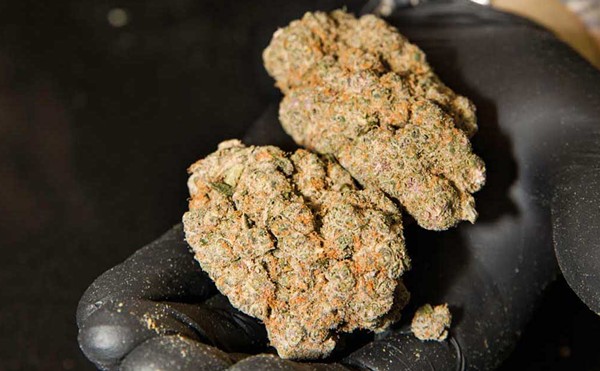Neil Franklin, executive director of Law Enforcement Against Prohibition (LEAP), is a dedicated advocate against the War on Drugs. He’s participated in it on the police side as a 33-year veteran of the Maryland State Police and the Baltimore Police Department. He’s served on drug squads and done undercover work.
LEAP is a national organization of former and current law-enforcement officers who support ending the War on Drugs. Franklin was among those, along with Michelle Alexander (author of The New Jim Crow), who convinced the national NAACP to pass a resolution calling for an end to the War On Drugs in 2011.
A couple of weeks ago, Franklin came to Detroit in an effort to help inform officials about effects of the drug war and ways to reduce the harm it does.
His organization contacted the mayor’s office. They contacted the emergency manager’s office. They contacted City Council. They contacted the Detroit Police Department. None of those entities charged with making and enforcing policy chose to meet with Franklin.
I guess it’s possible that they were all too busy to take time off from their crowded schedules to have a conversation with Franklin. After all, they’re busy trying to save Detroit’s grand bargain to bring us out of bankruptcy. The Police Department ran one of its big neighborhood sweeps, this one called “7 Mile Cruise,” while Franklin was in town.
These sweeps are good for PR. They give the sense that police are doing something significant to stop illegal drug activity it the neighborhoods. Police tend to grab some cash and property, some drugs and guns, make a few arrests of low-level drug couriers, but, in the end, life goes on more or less as usual. These things don’t impact the big picture.
Franklin’s visit was less dramatic. He spoke to a few organizations such as the Detroit Lions Club, made an appearance on Fox 2’s “Let it Rip” — during which he and District Judge Jodi Debbrecht-Switalski took turns telling each other that what they said is “not true.” He spoke to a group of activists at Cannabis Counsel and was a guest on the “Planet Green Trees” radio webcast via telephone from there. Cannabis Counsel is the downtown Detroit office of attorneys Matt Abel and Thomas Lavigne. Franklin also met with Donnell White, executive director of the Detroit branch of the NAACP while in town.
When the NAACP first came out against the War on Drugs in 2011, I contacted White’s office but got no response. Apparently Franklin has more pull with that organization. He works with various independent local NAACP chapters across the country. Franklin later reported that White “gets it. He understands it and is very concerned about the mass arrests that are going on in Detroit.”
When Franklin brought up what it means to end the War on Drugs, he says White isn’t willing to go that far.
During his talk at Cannabis Counsel, Franklin gave us some insight into how the drug war is conducted from the police side. He pointed out that about 60 percent of the police anti-drug activity is in regard to marijuana. That means the most benign of the substances police take aim at — including cocaine, heroin, meth, etc. — gets the most attention.
We also know that by far the subjects of that attention are African-Americans and Latinos — even though whites use drugs at about the same rate as everybody else. If you don’t believe that, take a look at Alexander’s The New Jim Crow. She breaks down the statistics, usage rates, arrest rates, incarceration rates, and the fallout in communities from incarceration. It’s devastating.
In effect, the War on Drugs creates a new class of people who lose their rights and become objects of discrimination.
Franklin talked about how it’s done in the black community. He said that young African-American police officers are recruited into drug units so they can infiltrate black communities.
“When I was on my first assignment, in the same barracks, in the basement was a squad of undercover narcs. I would bump into the sergeant from time to time. The sergeant said you ought to come in. … Before I knew it I was a member of that squad.
“You do this work and you got on blinders, tunnel vision. There was not data for us to analyze our work and know what we’re doing.”
Franklin says there were two black-owned nightclubs in the Maryland town where he was assigned. He made drug buys from people he met at the club — not from anyone who owned or ran the club. The buys made from contacts he made at one club never took place anywhere near the club. However, police were able to shut both clubs down as hubs of drug activity.
Another case he later told me about was how the reputation of a historically black university was sullied.
“I recruited this young man right out of the state police academy to make buys,” says Franklin. “All he found was a little bit of marijuana on the entire campus. But we made it sound like there was a huge drug problem on the entire campus. … It wasn’t true. The reason we used for targeting that community was completely false and upside-down.”
Franklin’s stories hit me personally. My brother-in-law is a retired military detective who worked on a drug squad. His son, my nephew, is a detective in Illinois who once did undercover drug work making buys.
I called my nephew and asked if he had been recruited to the job. He said yes. When I suggested that it was because he is black and upper administration needed young black men to infiltrate the community, he didn’t agree. He said it was because they noted his work ethic.
My thought was, well that’s what they told him.
Then I spoke with my brother-in-law. He also said that he was recruited and it was exactly because he is black and they wanted to infiltrate the black enlisted men. He also said that he advised his son to get out of that assignment as quickly as possible because his superior would begin to think that’s all he could do.
Most of these young officers are motivated by what they believe is a good thing. They are going to rid their communities of pernicious drug dealers.
Franklin talked about how he changed his mind on the subject. One of his best friends was killed, shot in the head while on undercover assignment. He talked about other friends he had lost in drug units. And finally he realized it was the policy that caused the problem.
For those who believe marijuana is a gateway drug to harder stuff, he points out that in legal dispensaries in Colorado and Washington state, nobody is offering their customers heroin or cocaine. And for people who are addicted to hard drugs, he says the health care model is a better route than having shootouts with drug dealers in the neighborhood.
Franklin says he plans on coming back to Detroit in October. Maybe by then he can get the attention of someone who drives policy in this city. In the meantime he keeps plugging away, trying to help people make a leap in their thinking about the drug war.
One mind at a time, if that’s what it takes.






